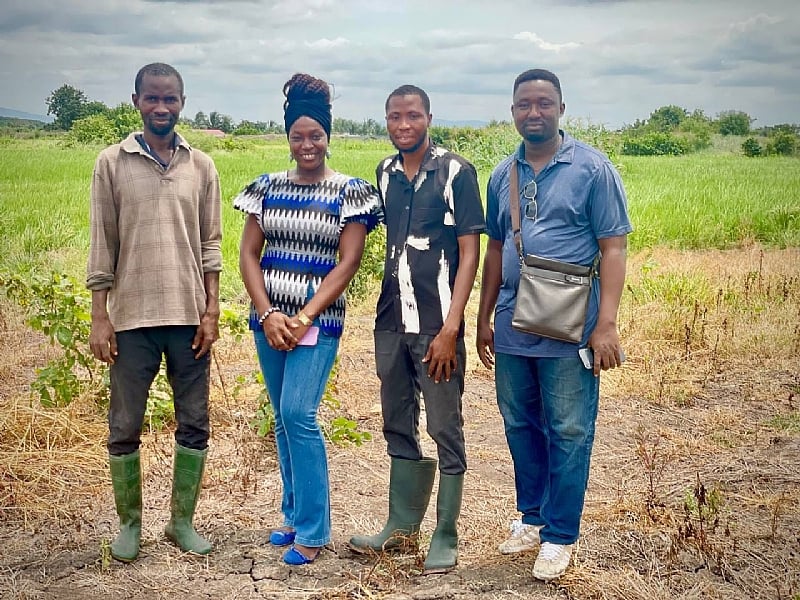The farmers of Amartey Kope, a rice-farming community near Akuse in Ghana’s Eastern Region, find themselves in a precarious position. While appreciative of the government’s ongoing agricultural support initiatives, they express a pressing need for more direct, transparent, and apolitical distribution of aid. Their concerns came to light during a visit by the AritaGlobe Foundation as part of the Green Dialogue Series Project, an initiative designed to assess the impacts of climate change on agricultural practices. The farmers acknowledged the existence of government programs meant to bolster the agricultural sector, but they highlighted the significant hurdle of ensuring that these resources reach the intended beneficiaries, the smallholder farmers who form the backbone of the industry. This disconnect between policy and implementation underscores a critical challenge within the agricultural support system.
The crux of the issue, according to Mr. Jones Akpaglo, a local rice farmer, isn’t the absence of government initiatives but rather the flawed distribution mechanism. He argued that political influences often divert resources away from the most vulnerable farmers, hindering the effectiveness of well-intentioned programs. This politicization of aid undermines the very purpose of these initiatives, leaving those who most need the support struggling to make ends meet. Mr. Akpaglo’s plea is for a targeted approach that prioritizes the needs of smallholder farmers, ensuring that the funds reach those who can genuinely benefit from them and contribute to the growth of the agricultural sector. This call for transparency and accountability in aid distribution is crucial for the long-term sustainability of agriculture in the region.
The farmers of Amartey Kope also face the daunting challenge of escalating rice production costs, further compounded by the unpredictable nature of climate change. Mr. Akpaglo detailed the significant financial investment required at each stage of rice cultivation, from land preparation involving multiple herbicide applications to the hiring of machinery for plowing. These costs create a high-stakes environment where farmers risk substantial losses due to unforeseen circumstances, including extreme weather events and fluctuating market prices. This financial vulnerability underscores the precariousness of their livelihood and the urgent need for effective support systems to mitigate these risks. The fear of losing a substantial investment, such as Ghc 20,000, and the subsequent impact on family welfare weighs heavily on the minds of these farmers, highlighting the critical link between agricultural success and overall community well-being.
Climate change adds another layer of complexity to the already challenging situation. The unpredictability of weather patterns, including erratic rainfall and increased temperatures, directly impacts crop yields and increases the risk of crop failure. This reinforces the need for climate-smart agricultural practices and support systems that equip farmers with the necessary tools and knowledge to adapt to these changing conditions. The farmers’ concerns underline the urgent need for integrated strategies that address both the economic and environmental challenges they face, ensuring the resilience of the agricultural sector in the face of climate change.
The AritaGlobe Foundation’s visit to Amartey Kope is a critical step in gathering firsthand information about the challenges faced by farmers across Ghana. This data will be compiled into a national report and documentary, providing valuable insights for policymakers and stakeholders to develop more effective climate adaptation strategies and agricultural support programs. The foundation’s efforts to amplify the voices of smallholder farmers are essential in bridging the gap between policy and implementation, ensuring that future interventions are tailored to the specific needs and realities of those working on the ground.
The farmers of Amartey Kope offer a clear and powerful message: government support, while appreciated, must be channeled effectively to reach those who need it most. This requires a shift towards more transparent and equitable distribution mechanisms, free from political interference. By prioritizing the needs of these farmers and providing them with the resources and support they require, the government can contribute to the sustainable growth of the agricultural sector, strengthen food security, and improve the overall well-being of rural communities. The voices from Amartey Kope serve as a powerful reminder of the importance of listening to those on the front lines of agriculture and incorporating their experiences into policy decisions.














